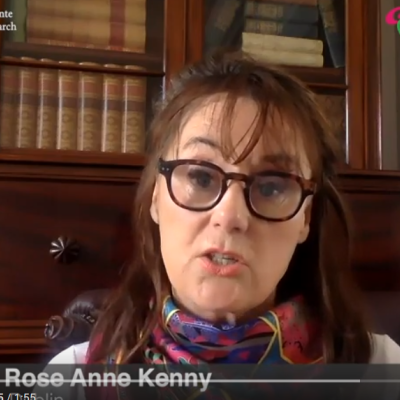COVID-19: TILDA project to survey and protect older people in Ireland
Lead Researchers: Professor Rose Anne Kenny, Dr Mark Ward, Dr Nollaig Bourke. Funded by: Irish Research Council and Health Research Board. Funding amount for both projects: €375,197.
3 min read - 29 Apr 2020

In summary
Death rates from COVID-19 in older adults are devastating, and the consequences of the pandemic on the physical, mental and emotional well-being of surviving older adults will be dramatic and long-lasting. The Irish Longitundal Study on Ageing (TILDA) is an ongoing research project looking at the health and wellbeing of a nationally representative group of more than 8,000 people aged over 50 in Ireland.
With funding from the Health Research Board and Irish Research Council, TILDA will gather information about who has been exposed to the virus and the risk factors for developing COVID-19 in that age-group. TILDA researchers will also survey 6,000 TILDA participants about how their health, behaviours and attitudes have changed in the pandemic. Together, the studies will help policymakers and health systems to optimise the national response to COVID-19 in the longer-term.
The problem
Older people are suffering severe consequences more than anybody else. We need more information about the association between COVID-19 and the much more likely consequences of the infection older people in Ireland, and we need to plan to support older people as they recover from the impact of the COVID-19 pandemic.
The projects
One project, led by Dr Nollaig Bourke at Trinity College Dublin, will look for important information relating to COVID-19 in the TILDA participation group of more than 8,000 people aged over 50 in Ireland. That study will examine blood samples from TILDA participants to see if they have been exposed to the virus that causes COVID-19 and explore risk factors. Another project will invite TILDA participants to take part in a survey about their health and wellbeing and behaviour and their experience of COVID-19.
The outcomes
- We will be in a better position to estimate how adults over the of 50 in Ireland are likely to have been exposed to the virus that causes COVID-19, even if they haven’t shown symptoms.
- The findings will inform future vaccination measures, and help us to achieve maximum protection for older people.
- We will have a better picture of what factors in older people in Ireland could be linked to more severe disease, and this will help identify people at risk.
- We will know more about the experience, attitudes, health and behaviour changes among older people that have arisen from the pandemic, and we can plan to support their long-term safety and wellbeing.
Professor Rose Anne Kenny, Principal Investigator and founder of TILDA and Professor of Medical Gerontology at Trinity College Dublin, says:
‘Older persons are most likely to experience severe and critical consequences of COVID-19 including death. The majority of deaths across Europe have been in older persons. The ability to mount an immune response declines with age. Understanding immunosenescence, its relationship to COVID-19 and therefore its impact on future vaccination responsiveness is a priority. Because TILDA has comprehensive data collected at regular periods for the past 10 years we can explore how immune profiles and other biological and social factors change over time and which changes enhance an individual’s vulnerability to infection.
The measures which have been introduced as a result of COVID-19 have particularly impacted on the lives of people over 70. The research will further enquire about the impact of these policies on mental and physical health and hear the voice and views of those most affected. This is important if we are to understand and manage the collateral damage from COVID-19′.
Professor Kenny speaks about the project on the HRB You Tube channel.
Dr Bourke speaks about the project on the HRB You Tube channel.
3 min read - 29 Apr 2020



